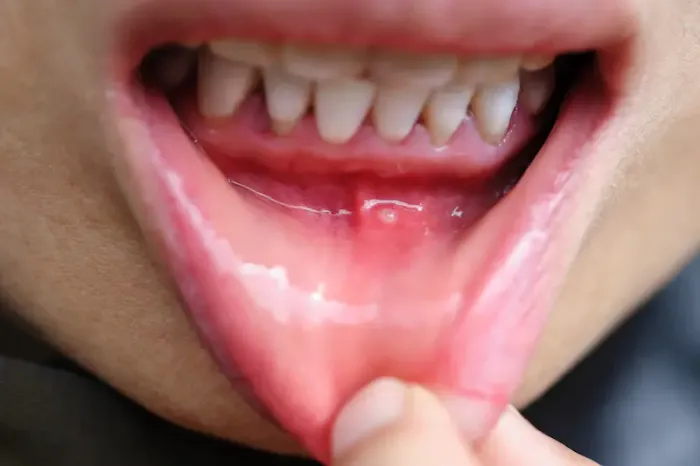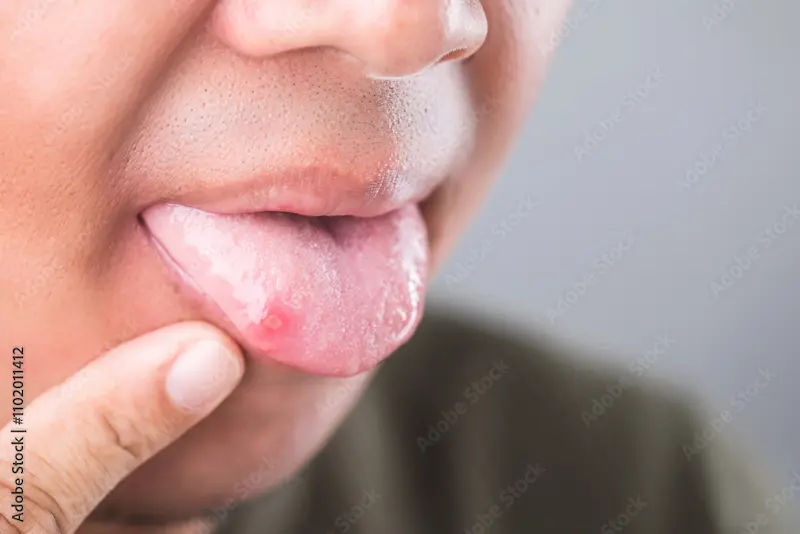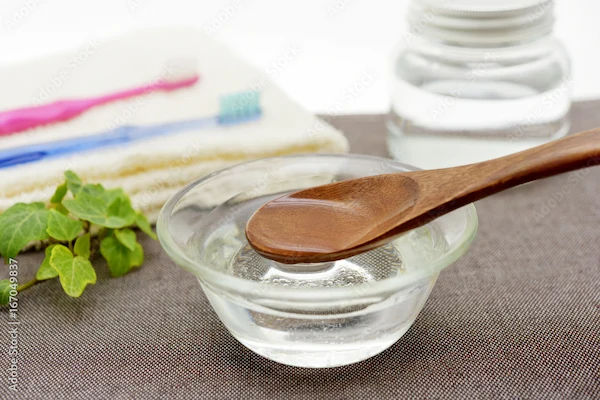Natural Mouth Ulcer Treatments: Soothe Pain and Heal Faster
Know about the mouth ulcer, what it is, top 10 natural remedies and the prevention of mouth ulcers.


Introduction
That familiar, sharp sting when you take a sip of orange juice or bite into your favourite food is a telltale sign that a mouth ulcer has arrived. These small, painful sores inside your mouth, also known as canker sores, can turn simple acts like eating and talking into daunting tasks. If you're tired of relying solely on over-the-counter products, you're in the right place. This comprehensive guide dives into the world of natural treatments for mouth ulcers, exploring proven home remedies that can soothe the pain, accelerate healing, and help prevent these pesky sores from returning.
What Exactly Are Mouth Ulcers?
Mouth ulcers are shallow, painful lesions that develop on the soft tissues inside your mouth—on your gums, inner cheeks, lips, tongue, or the floor of your mouth. Unlike cold sores, they are not contagious. They typically appear as round or oval sores with a white or yellowish centre and a red, inflamed border. The medical term for them is aphthous stomatitis.
Mouth Ulcer vs. Cold Sore: What's the Difference?
This is a common point of confusion. The key difference is location and cause. Mouth ulcers (canker sores) appear inside the mouth and are not contagious. They are thought to be triggered by internal factors like stress, hormones, or food sensitivities. Cold sores (fever blisters), caused by the herpes simplex virus (HSV-1), appear primarily outside the mouth—on or around the lips, under the nose, or on the chin. They are highly contagious, especially when weeping.
Consult a General Physician for Personalised Advice
Common Triggers and Causes of Mouth Ulcers
Understanding what triggers your mouth ulcers is the first step toward prevention. Common causes include:
Minor Injury: Accidental biting, aggressive brushing, dental work, or food with sharp edges (like chips).
Food Sensitivities: Acidic foods (citrus fruits, tomatoes) and trigger foods like chocolate, coffee, strawberries, eggs, nuts, and spicy or salty foods.
Nutritional Deficiencies: A lack of essential vitamins and minerals, particularly Vitamin B12, zinc, folate (folic acid), and iron.
Stress and Hormones: Emotional stress is a major contributor. Some women also experience them during hormonal shifts in their menstrual cycle.
Toothpaste Ingredients: Sodium lauryl sulfate (SLS), a foaming agent in many toothpastes, can trigger or worsen ulcers in some people.
Top 10 Effective Natural Remedies for Mouth Ulcers
Salt Water Rinse: The Classic Healer
This is the most accessible and one of the most effective natural treatments for mouth ulcers. Salt is a natural disinfectant. A warm saltwater rinse helps to gently cleanse the ulcer, reduce bacteria in the area, decrease inflammation, and create an environment that promotes healing. It’s a great first line of defense as soon as you feel one developing.
How to use: Dissolve half a teaspoon of salt in one cup of warm water. Swish this solution around your mouth for 30 seconds, focusing on the affected area. Spit it out. Repeat 2-3 times daily.
Baking Soda Paste: Neutralising the Pain
Baking soda (sodium bicarbonate) helps to neutralise the acids that may be irritating the sore. It also reduces inflammation and acts as a natural antiseptic, fighting bacteria.
How to use: Make a thick paste by mixing a small amount of baking soda with a few drops of water. Apply this paste directly onto the mouth ulcer. Let it sit for a minute or two before rinsing your mouth with warm water. You can do this 2-3 times a day.
Honey: Nature's Antibacterial Powerhouse
Honey, especially raw, unprocessed honey, has remarkable antibacterial and anti-inflammatory properties. Studies, including one published in the Journal of Ayurveda and Integrative Medicine, have shown that applying honey can significantly reduce pain, redness, and size of ulcers.
How to use: After rinsing your mouth, use a cotton swab to dab a small amount of honey directly onto the sore. Reapply several times a day.
Why Manuka Honey is Especially Effective
Manuka honey has a unique compound called Methylglyoxal (MGO), which gives it superior antibacterial potency. While more expensive, it can be particularly effective for stubborn mouth ulcers.
Coconut Oil: Soothing and Antimicrobial
Coconut oil contains lauric acid, which has antimicrobial and anti-inflammatory effects. Its smooth, oily texture also creates a protective barrier over the ulcer, shielding it from irritants and providing instant soothing relief.
How to use: Apply a small amount of virgin coconut oil directly to the ulcer. Repeat 3-4 times a day and before bed.
Chamomile Tea: A Calming Compress
Chamomile contains compounds like azulene and levomenol, which are known for their anti-inflammatory and antiseptic properties. Using a chamomile tea bag as a compress can directly deliver these benefits to the sore.
How to use: Steep a chamomile tea bag in hot water for a minute, then remove and let it cool until it's warm and comfortable to touch. Hold the damp tea bag directly on the mouth ulcer for 3-5 minutes. You can do this a few times a day.
Supporting Your Body: Nutritional Tweaks for Prevention
Healing from the outside is helpful, but supporting your body from the inside is crucial for long-term prevention. A common cause of recurrent mouth ulcers is nutritional deficiency.
Key Vitamins and Minerals to Fight Ulcers (B12, Iron, Zinc)
Vitamin B12: A 2017 study in the Journal of the American Board of Family Medicine found that participants who took a B12 supplement experienced a reduction in canker sore pain and the number of outbreaks, regardless of their initial B12 blood levels.
Iron: Iron deficiency anaemia is a well-known contributor. If you have recurrent ulcers, it might be worth getting your levels checked. Apollo24|7 offers convenient home collection for tests like a Complete Blood Count (CBC) or ferritin test to check for anaemia.
Zinc: Zinc is vital for immune function and wound healing. A zinc lozenge or supplement can help reduce the duration and severity of outbreaks.
Foods to Embrace and Foods to Avoid
Embrace: Yoghurt (probiotics), leafy greens (folate, iron), salmon (B12), lentils (iron, zinc), and whole grains (B vitamins).
Avoid: Acidic fruits (oranges, lemons), spicy foods, sharp snacks (potato chips, pretzels), and very salty foods, which can all cause irritation or trigger new sores.
When to Seek Professional Help?
While most mouth ulcers heal on their own within one to two weeks, certain signs warrant a doctor's attention. If your mouth ulcer is exceptionally large, lasts longer than three weeks, is accompanied by a high fever, spreads rapidly, or causes severe pain that makes eating and drinking difficult, it's crucial to consult a professional. Persistent ulcers can sometimes be a sign of an underlying condition that needs medical diagnosis. You can consult a doctor online with Apollo24|7 for a quick evaluation and advice on whether a physical visit is necessary.
Conclusion
Dealing with mouth ulcers can be frustrating, but as we've explored, nature offers a powerful pharmacy of solutions. From the simple simplicity of a saltwater rinse to the potent healing properties of honey and coconut oil, you have numerous safe and effective options to manage the pain and speed up recovery. Listen to your body, experiment with these natural treatments for mouth ulcers to find what works best for you, and take comfort in knowing that relief is often found in the simplest of ingredients.
Consult a General Physician for Personalised Advice
Consult a General Physician for Personalised Advice

Dr. Rajib Ghose
General Physician/ Internal Medicine Specialist
25 Years • MBBS
East Midnapore
VIVEKANANDA SEBA SADAN, East Midnapore

Dr. Ajay K Sinha
General Physician/ Internal Medicine Specialist
30 Years • MD, Internal Medicine
Delhi
Apollo Hospitals Indraprastha, Delhi
(200+ Patients)

Dr. Sougata Kumar
General Practitioner
8 Years • MBBS
East Midnapore
VIVEKANANDA SEBA SADAN, East Midnapore

Dr Syed Mateen Pasha
General Physician
2 Years • MBBS
Bengaluru
PRESTIGE SHANTHINIKETAN - SOCIETY CLINIC, Bengaluru

Dr. Arthi S
Family Physician
3 Years • MBBS
Bengaluru
PRESTIGE SHANTHINIKETAN - SOCIETY CLINIC, Bengaluru
More articles from Mouth UlcerMouth Ulcer
Frequently Asked Questions
1. How long does it take for a mouth ulcer to heal naturally?
Most minor mouth ulcers heal on their own within 7 to 10 days. Larger or more severe ulcers may take up to 6 weeks to heal completely. Using natural remedies can help shorten this healing time.
2. What is the fastest way to get rid of a mouth ulcer overnight?
While it's difficult to heal one completely overnight, you can significantly reduce pain and speed up healing. A combination of rinsing with salt water, applying a baking soda paste, and then dabbing on honey before bed can provide the fastest relief and create an optimal healing environment.
3. Can a lack of sleep cause mouth ulcers?
Yes, indirectly. Lack of sleep is a major contributor to stress and a weakened immune system. Since both stress and a compromised immune system are common triggers for mouth ulcers, poor sleep can definitely make you more susceptible to an outbreak.
4. Is it okay to put salt directly on a mouth ulcer?
It is not recommended. Putting dry salt directly on an ulcer can be extremely painful and may cause further tissue irritation. It's always best to dissolve salt in warm water to create a gentle rinse that offers disinfecting benefits without the extreme pain.
5. When should I be worried about a mouth ulcer?
You should consult a doctor if an ulcer hasn't healed after three weeks, is unusually large or painful, keeps coming back, appears after starting a new medication, or is accompanied by a high fever, rash, or difficulty swallowing. You can consult a doctor online with Apollo24|7 for a quick evaluation of mouth ulcers.



